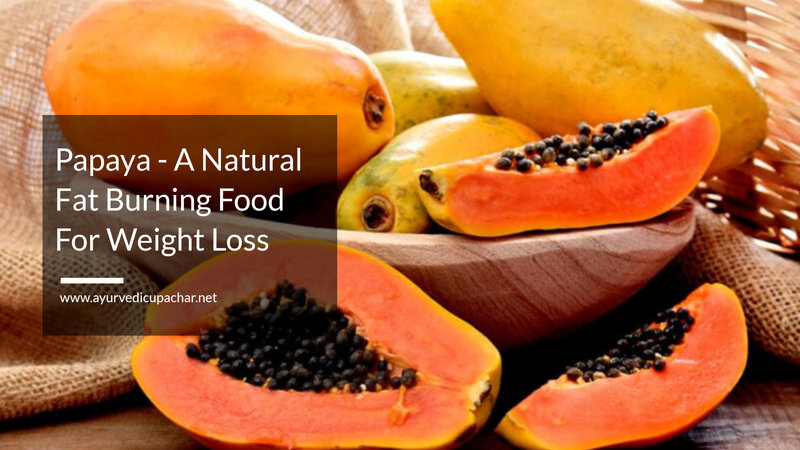Papaya – A Natural Fat Burning Food For Weight Loss
Papaya is a tropical fruit that is known for its sweet and musky flavor. It is native to Central America and is now cultivated in many tropical and subtropical regions around the world. The papaya tree, also called Carica papaya, produces large, melon-like fruits that can vary in size, shape, and color.
The most common type of papaya is the solo papaya, which is pear-shaped and usually has yellow or orange skin when ripe. Inside, the flesh is a vibrant orange color with black seeds clustered in the center. The seeds are edible but have a bitter taste.
Papayas are rich in vitamins A and C, as well as dietary fiber and antioxidants. They are also a good source of folate, potassium, and magnesium. Papayas are known for their digestive enzyme called papain, which aids in digestion and can be beneficial for people with digestive problems.
To eat papaya, you can simply cut it in half lengthwise, scoop out the seeds, and eat the flesh with a spoon. It is also commonly used in fruit salads, smoothies, and desserts. In some cuisines, green papayas are used in savory dishes like salads and curries.
Why Is Papaya Good For Weight Loss?
Papaya is considered a helpful fruit for weight loss due to several reasons. According to Dr. Ahmed Zayed, an evidence-based expert, fruit consumption, including papaya, is associated with a reduced risk of obesity, hypertension, cardiovascular disease, and certain types of cancer.
Here are some ways in which papaya can aid in weight loss:
1. Diuretic properties: Papaya is composed of approximately 90% water, making it an excellent diuretic. This means it can help promote urine production and reduce water retention.
2. Antioxidant content: Papaya contains an important antioxidant called lycopene, which is even more significant than vitamin A in this fruit. Lycopene contributes to the vibrant color of papaya and also possesses antioxidant effects, protecting the body from damage caused by free radicals.
3. High fiber content: Papaya is rich in dietary fiber, offering approximately three times the amount found in an average food serving, which helps improve digestion and alleviate constipation.
Fiber also plays a role in managing blood glucose levels and blood cholesterol, as it slows down their absorption into the bloodstream.
Consequently, there is speculation that papaya may provide protection against colon cancer and certain cardiovascular diseases, as mentioned by Vanesa León García, a member of the Press Committee of the Association of Dietitians-Nutritionists of Madrid (Addinma).
4. Low in calories: Papaya is a relatively low-calorie fruit, which means you can enjoy it without consuming excessive calories. This is beneficial for weight management, as it allows you to include a satisfying and nutritious fruit in your diet while keeping your calorie intake in check.
5. Supports digestion: Papaya contains an enzyme called papain, which aids in the breakdown of proteins and promotes healthy digestion. Efficient digestion is crucial for weight loss, as it helps the body absorb nutrients properly and prevents digestive issues that can hinder weight loss efforts.
6. Satiety and appetite control: The high fiber content in papaya contributes to a feeling of fullness and can help control appetite. When you feel satiated, you’re less likely to overeat or indulge in unhealthy snacks, which can support weight loss goals.
7. Nutrient-dense: While being low in calories, papaya is rich in essential vitamins, minerals, and antioxidants. It is a good source of vitamin C, vitamin A, folate, potassium, and magnesium. When trying to lose weight, it’s important to nourish your body with nutrient-dense foods to support overall health and well-being.
8. Natural sweetness: Papaya offers a naturally sweet and satisfying flavor, making it a healthier alternative to processed sweets and desserts. By incorporating papaya into your diet, you can satisfy your sweet cravings without consuming excessive added sugars or unhealthy ingredients.
Remember, while papaya can be beneficial for weight loss, it’s important to adopt a well-rounded approach that includes a balanced diet, regular physical activity, and overall healthy lifestyle habits. Individual results may vary, so consulting with a healthcare professional or registered dietitian is always recommended for personalized advice.
How Is The Papaya Diet Made?
The Papaya Diet involves incorporating fresh, slightly unripe papaya into your eating plan. It is advisable to choose organic papaya and avoid overripe ones. Here’s a breakdown of how the diet is typically structured:
1. Hydration: Drink at least 2 liters of water daily to aid in proper detoxification and elimination of toxins from your body.
2. Mono-fasting: The initial two days of the diet are considered mono-fasting days, where you consume only one food throughout the day: papaya. Whenever hunger strikes, eat papaya as much as needed. Remember to drink at least 2 liters of water during this period.
3. Morning Routine: Start your day with 2 tablespoons of extra virgin olive oil, followed by a glass of water with lemon juice. This can help kickstart your digestion and metabolism.
4. Post-Fasting Transition: After the initial two days of mono-fasting, the following day begins with a glass of water with lemon juice and a plate of papaya for breakfast. Wait at least 30 minutes before consuming any other food. When you do eat, focus on soft foods such as steamed rice, whole grains, yogurt, vegetable milk, and avoid processed foods like sugars and flour. The diet should be centered around cereals, vegetables, and vegetable milk to enhance the effects of papaya.
5. Balanced Meals: Include fish, steamed vegetables, or vegetable broth in your meals while avoiding saturated fats. This allows for a nutritious and well-rounded eating plan.
6. Exercise: It is recommended to incorporate some form of exercise into your routine while following the Papaya Diet. This can involve simple exercises like sit-ups or going for a run. Regular physical activity can enhance the effectiveness of the diet.
During the diet, it is normal to experience symptoms like constipation, diarrhea, or stomach discomfort, as your body may undergo a “healing crisis” while eliminating toxins and waste.
Note:
Please note that before starting any diet or significant dietary changes, it’s important to consult with a healthcare professional or registered dietitian to ensure it is appropriate for your individual needs and health condition.
They can provide personalized guidance and support to help you achieve your weight loss goals in a safe and effective manner.






















